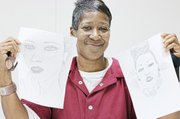Family relapses into system
Mother, son in jail at same time; they want to break cycle
Joey Matthews | 9/26/2014, 5:55 a.m.

Patricia Hicks passed her son on her way to a worship service earlier this month.
Sherod Jones blew his mother a kiss, crossed his heart and mouthed the words, “I love you.”
While she could not hear what he said, the gesture still meant the world to her.
“It showed me that he still cares about me,” Ms. Hicks said, wiping away tears.
The mother and son were separated by the walls and windows at the Richmond Justice Center in Shockoe Valley.
Both Richmonders are being held in the new city jail.
She went to trial on burglary and larceny charges Wednesday. He is awaiting transfer to prison after a robbery conviction.
Ms. Hicks said she, her son and other family members have spent much of their adult lives behind bars for crimes mostly related to their drug addictions, mental health problems and poverty-related issues.
Rarely have the mother and son shared good times.
“When I see my mom locked up here, it’s not shocking to me,” Mr. Jones told the Free Press in recent separate interviews with the mother and son at the jail. “I’m used to seeing my mom locked up. We’ve never spent what I would call normal time together like a mother and son would.
“I wish I could have taken her out to dinner more, gone to the movies or talked to her about issues that have bothered me. But we’re more like Bonnie and Clyde, like convicts together.”
The two share a love of sketching their anger, despair and hope on paper.
They shared their work with a Free Press reporter and photographer.
Their work shows a struggle with drugs and family dysfunction and a wish for faith, love and hope.
The mother and son’s sad story is not unusual in disadvantaged neighborhoods, local experts said, particularly among the African-American community that is disproportionately targeted, arrested, convicted, incarcerated and placed under strict oversight once they leave prison.
Thousands of African-Americans become embedded in the criminal justice system and often become conditioned to living behind bars.
About 90 percent of the current inmate population at the Justice Center is African-American, according to jail spokesman Jerry Baldwin, in a city with a population that is 50 percent black.
Data show that about 40 percent of the almost 2.1 million men in prison across the country are African-American, while African-American males comprise about 12 percent of the civilian population.
Sarah Scarbrough directs programs at the Justice Center designed to give inmates tools to succeed after their release. She described the conditioning of families and communities ensnared in the criminal justice system.
“Generations and generations get involved with the system and don’t make it out,” she told the Free Press. “They are so comfortable behind bars that they are literally scared to get out, and do what they can to stay in sometimes.”
Ms. Scarbrough told of a longtime prison inmate who performed a gratuitous sex act in front of the parole board because he was afraid to leave the comfort zone he knew in prison.
She said a new program called REAL, or Recovering from Everyday Addictive Lifestyle, is being implemented throughout the jail under Sheriff C.T. Woody Jr. to offer a comprehensive approach “to address their addictions and behaviors, while appropriately modifying their thinking.”
Sheriff Woody, a 46-year veteran of law enforcement, calls the generational cycles of addiction, criminality and incarceration “heartbreaking.”
“For years, I have seen the same people cycle through the system. There are mothers and sons, brothers, sisters, uncles, aunts and grandparents — all incarcerated at the jail at the same time. Constantly, we have family members who are reunited behind the bars of the jail.”
He said seeing inmates grow comfortable behind bars has sparked his desire to have Ms. Scarbrough and others implement more programs to help the inmates break those institutional cycles.
He cited a renewed focus in the Justice Center on family outreach and integration, educational opportunities, parenting classes, addiction classes, mental health services, faith-based programs and job training as a means to reach those who have earned the title of “career criminal” and providing them opportunities for change.
The focus is on inmates like Ms. Hicks and her son.
“It’s all I know — that and being on the streets,” Ms. Hicks said.
“I feel like I’ve been in captivity my whole life,” Mr. Jones said.
They have vowed not to accept imprisonment as a way of life.
Ms. Hicks, 52, has been at the jail since June 24 on her current charges. She has been to the penitentiary six times, estimated she has been in the city jail about 15 times and was in juvenile detention twice. Her latest charges garnered five years, with nearly four suspended.
“I can’t say why I display this behavior,” she said. “I know I have a mental disorder. Maybe I was just born this way.”
She blames most of her crimes on attempts to fuel a heroin habit. She recalls first injecting the drug at a young age. Her mother, she says, would put her to sleep by giving her beer.
Her mother died when she was 12 and her father, who was in and out of prison most of his life, died two years ago.
Ms. Hicks said she deeply regrets not being a better example for her son and not being around to steer him from trouble.
After her release, she said she hopes to enter a drug treatment program to get clean and to become a better mother.
“I want to show the court I’m a changed person,” she said. “I want to live life one day at a time and live the life God has given me. I want to be rich in spirit and help others through my experiences.
“I want to tell my son that I love him so much and want to be a real mother to him.”
Ms. Scarbrough said this time will be different for Ms. Hicks when she re-enters society.
“We will not let this woman go back to where she was,” she said. “We will get her into a very intensive, rigorous” drug treatment program.
Ms. Hicks said she’s grateful she was arrested and credits it for saving her life.
“I was almost dead when I came here because I was on heroin so bad,” she said. “I weighed only 115 pounds when I came in here; now I weigh 150. This has given me another chance at life. It’s been miraculous.”
She said her son telling her she needed help fueled her desire to change because it meant “he still cared about me.”
Mr. Jones, 36, has been held in the city jail since Oct. 31, 2013. He was sentenced to 13 years in prison for robbery and is awaiting transfer to a state prison.
This will be his fourth prison stint. The others are related to convictions for drug possession or sales and assaults and robberies.
He said he had little guidance from his family as a youngster. “Most everyone around me was an alcoholic or did other drugs or sold drugs,” he said.
His mother always getting high or being behind bars “seemed normal to me.”
He said his father was shot and killed when he was 4. He lived with a succession of family members and then in a rotation of foster homes.
“I just make bad decisions because of my environment,” he said.
He wants to turn his life around to avoid becoming like others behind bars who have given up.
“I’m tired of being here. I cry in my dreams. I know I can change if I get the help I need.”
Ms. Scarbrough said in the two months she has known Mr. Jones, he has been a model inmate and mentors younger men.
He also has aided her efforts to implement a “culture of accountability and compliance” at the Justice Center, she said.
“He has really done well and I’m very proud of him,” she said.








